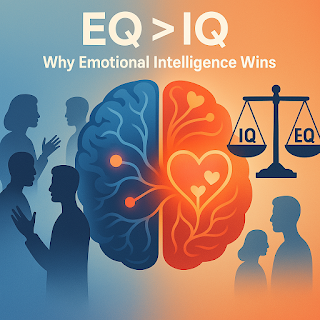💡 Emotional Intelligence: Why It Matters More Than IQ
Let’s pause for a moment and ask ourselves a big question: In a world that praises academic success and high IQ scores, are we ignoring what truly helps us thrive—emotional intelligence?
You may ace your exams, crack tough problems—but still struggle with understanding yourself or others. Or feel overwhelmed by your emotions, unsure how to handle stress, conflict, or failure.
The truth? IQ may get you hired, but EQ helps you grow. So in this blog, let’s explore why emotional intelligence is rising in value, how it shapes success and relationships, and how you can develop this vital skill to lead a more fulfilling life.
-
🌱 Start with Self-Reflection – Do You Understand Your Emotions?
We often assume we’re in control because we’re smart. But do you recognize how your feelings influence your behavior and decisions?
✅ Try This: Ask yourself: “What emotions did I feel today, and why?”
Journal your emotional patterns. Reflect on how you reacted during stress or conflict.
🧠 Remember: Emotional self-awareness is the foundation of true intelligence.
-
🎯 Set Growth Goals – Emotional Intelligence Requires Practice
High EQ isn’t about being nice all the time. It’s about being aware, thoughtful, and balanced in how you respond.
✅ Turn insight into action: Instead of “I wish I was less reactive,” try:
Pause and breathe before replying during arguments
Ask for feedback from a close friend or mentor
Practice naming your emotions out loud
Learn to separate feelings from facts before making decisions
📌 Emotional maturity is built one intentional moment at a time.
-
🧭 Don’t Compare Emotional Responses – Everyone’s Wired Differently
Just like learning styles vary, so do emotional reactions. Don’t judge your sensitivity or calmness—understand it.
✅ Focus on your journey: Celebrate your progress in handling tough conversations or controlling impulses.
💡 Pro Tip: Emotional intelligence isn’t about perfection—it’s about progress.
-
🔥 Understanding vs. Reacting – Can You Tell the Difference?
Are you responding based on reason or just reacting to emotions?
✅ Warning Signs of Low EQ:
You get defensive easily
You interrupt or shut down in hard conversations
You struggle to admit mistakes
🎯 Emotional intelligence empowers you to respond with clarity, not just react with intensity.
-
✨ Take Imperfect Growth Steps – Learning EQ Is a Journey
The biggest blocker to growth is thinking you’re “just not good with emotions.” That’s not fixed—it’s trainable.
✅ Action Ideas:
Own your feelings instead of blaming others
Apologize when you’re wrong—even if it’s awkward
Practice active listening without thinking of your reply
🌟 Emotional strength comes from humility, not ego.
-
🛠 Build an Emotional Routine – Consistency Builds Intelligence
Emotional intelligence doesn’t come from reading alone—it comes from living with awareness, daily.
✅ EQ Routine Blueprint:
Daily:
Do one check-in with your feelings and ask why you feel that way
Listen to someone without interrupting or advising
Weekly:
Reflect: Did I handle one tough emotion or conversation better than before?
Practice a calming strategy—like journaling or deep breathing
⏳ Emotional fitness is just like physical fitness—it needs repetition.
-
💬 Surround Yourself with Emotionally Aware People
Toxic or dismissive people hinder your growth. Surrounding yourself with self-aware individuals accelerates your emotional learning.
✅ What to do:
Follow creators or experts who teach emotional skills and mental health
Join discussion groups, workshops, or online spaces for emotional learning
Keep company with those who speak truth with kindness
🤝 Emotionally intelligent people help you grow, not shrink.
🧭 Bonus: Signs You’re Building Emotional Intelligence
Still unsure if you’re improving your EQ? Look for these signs:
✔ You pause before reacting
✔ You own your emotions without shame
✔ You listen with the intent to understand
✔ You handle feedback without defensiveness
✔ You feel more stable even under pressure
💬 Common Myths About Emotional Intelligence (Debunked!)
❌ “EQ is only important for sensitive people.”
✅ Everyone needs it—leaders, students, friends, and parents.
❌ “You can’t improve EQ—it’s fixed.”
✅ False. EQ is a skill, not a trait. It grows with practice.
❌ “IQ matters more for success.”
✅ Studies show EQ is a stronger predictor of long-term success and happiness.
🏁 Final Thought: EQ Is the Key to a Fulfilling Life
Emotional intelligence isn’t soft—it’s smart. It helps you succeed not just in careers, but in relationships, decision-making, and inner peace.
You don’t need to be the smartest in the room—you need to be the most aware.
And once you start honoring your emotions instead of ignoring them, life starts to feel whole again.
🎯 So ask yourself today: “Am I emotionally aware—or just intellectually active?”
It’s your life. Your emotions. Your journey. Your power.
Start feeling. Start listening. Start evolving.
🙌 Thank You for Reading!
Thank you for reading! I hope this inspired you to reflect on your own dream and take a step toward it today. 🌟make sure to leave your comments, further more details contact.
Email Id : msdinesh245@gmail.com WhatsApp : 7010246199




Comments
Post a Comment